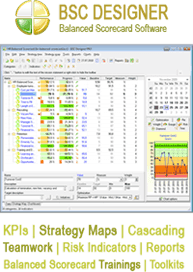Motivated personnel drives company to success
There are many success factors in implementation of balanced scorecard. First and foremost, company top management should have a true faith in this system. Moreover, top managers and business owners have to show this faith to ordinary personnel. If company management is ready to risk their money in order to implement balanced scorecard and start changes in their organization, this means that they truly believe in success and in balance scorecard as a revolutionary strategic management tool. Companies that have successfully implemented balanced scorecard will never part with this system. Indeed, balanced scorecard is not just another managerial tool. This is philosophy. Having improved indicators in the dashboard does not mean success. Successful implementation of balanced scorecard is understanding that your company or your business will not be able to survive without BSC. Successful implementation of balanced scorecard means that it is impossible to make any steps back.
But is it enough that only top management believes in balance scorecard? Of course not! Successful implementation of balanced scorecard implies involvement of ordinary personnel. Moreover, employees it all company levels must to dissipate in development of strategy and strategy maps. This is explained by the fact that, for example, front line sales managers have the most complete information on company customers, there requirements, conduct patterns, demands, new trends in the market etc. These people are so much closer to the real business world than top managers and their high offices.
But how to get ordinary personnel involved in development of strategy maps and maintenance of balanced scorecard? Employees must be motivated. That’s why successful use of balanced scorecard implies introduction of a comprehensive and fair reward system
Employees must be financially interested in higher performance. Better BSC results should bring benefits for employees. For example, a sales manager should know how his job contributes to implementation of company strategic goals, as well as how his performance can affect his salary.
It should be noted that reward and bonus systems can have nonmaterial character. For example, top performing employees may be offered free learning courses, participation in any interesting business seminar, additional day offs etc. Experience shows that nonmaterial rewards a greatly valued by employees.
It is also very important to reward employees for their contribution to implementation of strategic goals but not only for improvements and Balanced Scorecard perspectives. For example, number of calls made to customers does not automatically mean sales growth. Thus, it would be logical to encourage employees for increased in sales but not for their attempts to improve these results.




